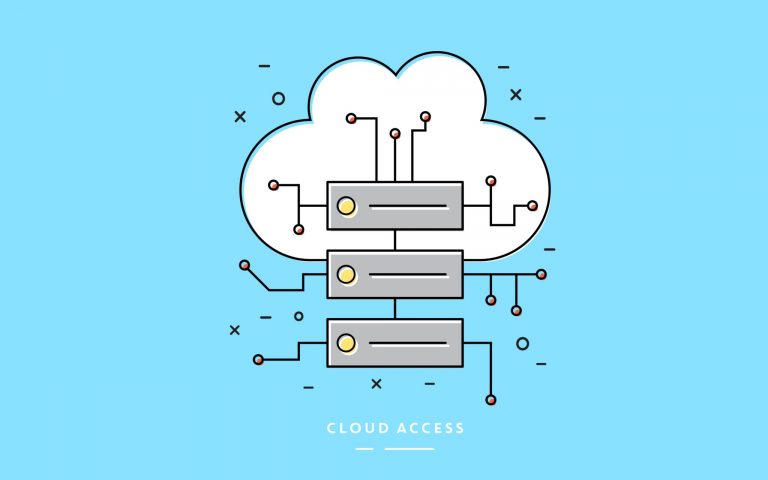The development of cloud-based computing moved the world for software developers. Above all, it canceled limits related to storage, flexibility, and cost. It also marked a new era of software innovation, enabling the development of fundamentally new and game-changing cloud-based services like Dropbox and Google Drive.
In recent years a new technology with even more innovative potential appeared. We are referring to blockchain that already drew the attention and curiosity of many developers. The blockchain is what the cloud was always supposed to be — a truly transparent and interlocking network that excludes the need for a centralized national or transnational authority and resolves the cloud’s most concerning and troubling security risks.
Blockchain really is a cloud 2.0 with the best transnational support, centralized data sets, and vast reach of data security. It has so many benefits that cannot be ignored, just check out the diagram below that was provided in a recent research:
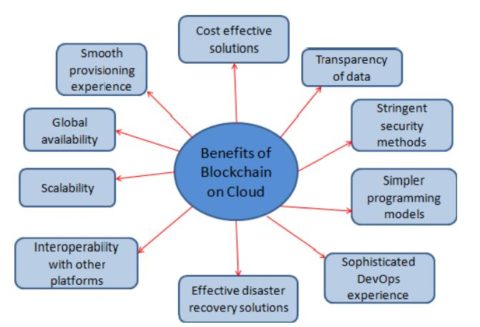
Cloud computing and blockchain usage are the future of digital business transformations. Here is what Gartner specialists think about cloud-based services:
36% of IT spending on implementation services is cloud-based, and 28% of IT spending on software is software as a service (SaaS). The number of cloud managed service providers will triple by 2020. This represents the “cloud gold rush,” and this period of rapid expansion will be followed by a massive consolidation period after 2020 until 2023.
Gartner
The cloud possibilities combined with blockchain technology are boundless. So in this article we would like to speak about blockchain vs cloud computing, cover some key points related to blockchain as a service (BaaS), and highlight how businesses can benefit from these technologies. Ready to dive into this topic? Then let’s get started!
Blockchain VS Cloud computing – which is better?
Right now corporations massively rely on the dedicated server infrastructure and cloud solutions like AWS, Microsoft Azure, Google, etc. But the business landscape doesn’t stand still. It becomes heavily structured and decentralizes day after day, which requires a decent level of flexibility from big companies.
In the modern world, whether you’re a big corporation or a small DIY maker you’re still dependent on a supply chain spread across the globe. Adding to this mess security precautions and a need for notarizing and you can imagine what a documentation nightmare big corporations are facing day after day.
Naturally, businesses are looking for better document management solutions, and that is exactly where blockchain and cloud computing come in handy. But what actually differentiates them? And can they work together? Let’s speak about it in detail, beginning with their respective definitions.
What are cloud computing and blockchain?
Cloud computing is a service or framework in which you utilize compute power and pay for what you use. Cloud computing offers faster innovation, flexible resources and allows delivering computing services over the internet. This technology is perfect for the businesses that are going to scale in the future and would like to have efficient infrastructure.
Blockchain is a document with a specific structure. Blockchain technology helps to keep a record of transacted digital assets history. It consists of three crucial concepts that are blocks, miners and nodes.
A blockchain itself is just a list of blocks sequentially linked and interconnected by the time of creation. The first block created in 1 day may be linked to the second created a day later, and so on. Each block has three data values: a hash pointer (this number links block to a previous one), a timestamp (date of creation/modification), and a transactional data itself (amount of money/document info).
Blockchain and blockchain networks may be part of a cloud computing service. Amazon and Microsoft offer blockchain as a service. However, blockchain offered as a service defines the purpose of the most important use case of a blockchain – doing transactions without a central third party. Here is how the scheme looks like:
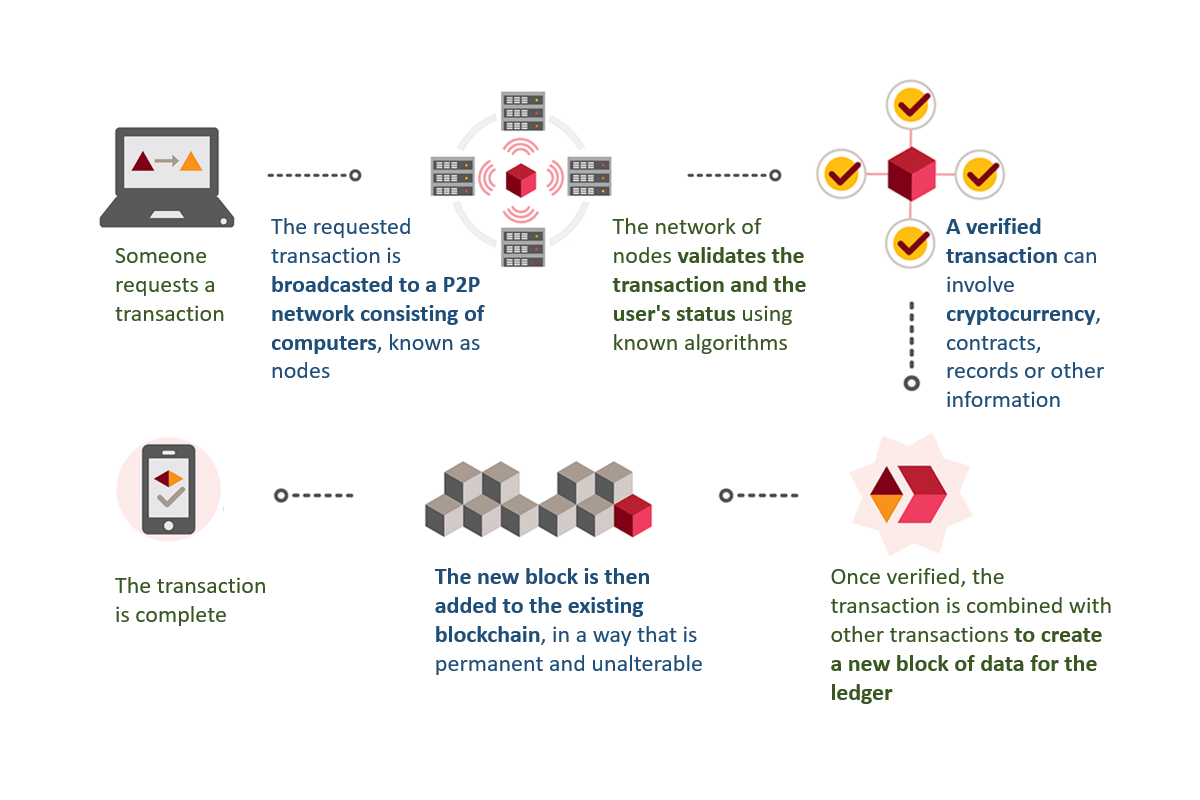
Currently several blockchains can run decentralized application platforms or “dApps”. As of now the most notable ones are Ethereum, EOS, and Tron.
Decentralized applications that run on a blockchain offer a number of benefits that may be advantageous to consumers over applications that run on cloud computing services.
What’s the difference between them, then?
Now when you know the key aspects related to cloud computing and blockchain, and how they can work together, it’s time to take a look at their differences. Cloud computing is an extremely centralized model, while blockchain and platforms powered by it rely on full decentralization.
One more difference is that cloud service lets you store and access any data online easily, and blockchain uses different kinds of encryption to store data in special protected databases. The data located in the cloud is changeable, while in blockchain it is not.
Cloud can offer services in several different forms. You’ve probably heard about Platform as a Service (PaaS), Software as a Service (SaaS), and even Infrastructure as a Service (IaaS). The cloud does not assure full data integrity and does not guarantee that the data will be tamper-free. And blockchain does that.
If you are going to develop corporate software powered by blockchain then cloud can help you achieve great results and execute what’s planned. It will keep all data in one place – in your company data center. However, blockchain technology will still demand to preserve its key principles and data transparency.
Why use Blockchain for corporate network
Digital transformation is a serious engagement, especially if you are building corporate solutions that should be scalable, secure and reliable. No one wants to deal with data breach or necessity to make drastic changes every year. After all, it’s the software that should serve your needs, and not the other way around.
So to help you understand why blockchain might be a perfect fit for business software, we have collected some important reasons that can help you make the right decision.
Stability
Unlike the traditional database architecture (including cloud), where data is stored on a centralized server, blockchain is stored on machines of all participants. Each computer in the network stores, calculates and applies changes to the blockchain. Such decentralized architecture makes blockchain stronger the more computers in the network. Therefore, if someone forges/erases data from one machine, many others still have the same copy of blockchain to protect the authenticity of the information stored in it.
Banks and corporations spend billions of dollars to protect and maintain their server infrastructure, while still having leaks and virus attacks like “WannaCry”. By applying blockchain to the corporate network, which consists of thousands of computers, a company can gain a stable and unbreakable system.
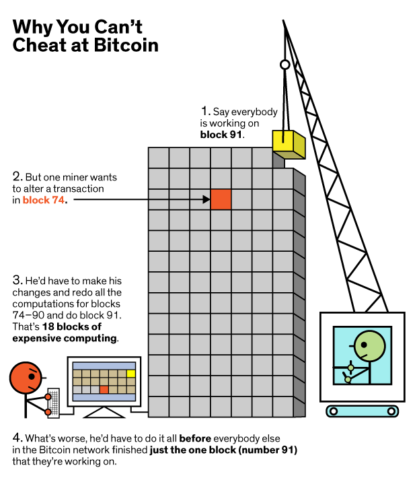
Accessibility & Confidentiality
Certainly, storing valuable data on every machine in the office is not a good idea if you have some corporate secrets. Therefore, blockchain encrypts each transaction data file. After data encryption takes place, an owner gets two keys: public key (used to view the document), and private key (used to modify the document).
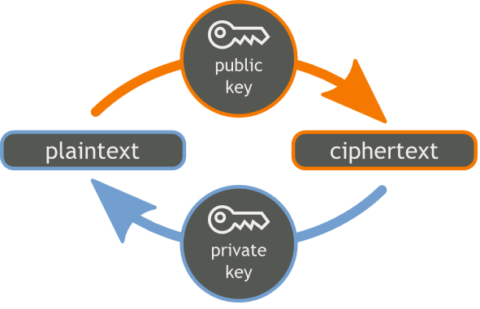
It must be acknowledged that without encryption keys, all files will be only an unstructured mess of bytes, which effectively protect information and secrets in it. This way anyone in the company can access any file at any time, while only an owner can allow someone to view the file.
On the other hand, from the confidentiality point of view, blockchain technology has no advantage over a centralized database architecture. They both can use sophisticated encryption algorithms. Moreover, centralized databases can be completely disconnected from the network and external world.
Legal Transaction Facilitation
By incorporating blockchain you get a range of advantages. For example, it can help you with the following:
- Document forgery protection.
- Confirmation of data ownership without showing actual data.
- Protection against plagiarism by applying document timestamping.
By offering such a unique set of features blockchain can effectively replace paid notary services. Think of it as a distributed ledger where blockchain can be used instead of third-party intermediaries that are usually used to make legal agreements and verify them.
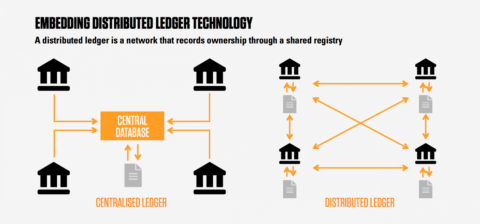
Performance
Sadly, duplicating all the data and storing it on multiple computers drains a lot of energy and storage space. Especially if you want to store videos, images, and heavy-weight pdf manuals. By now, a centralized server infrastructure offered by the cloud is the only reasonable solution for such type of content.
For instance, we prefer using Amazon Web Services (AWS). AWS is reasonably priced and offers a wide range of services like Load Balancing service that redistributes loads between servers, or EC2 which dynamically moves data to the instances (Europe to Europe, China to China) depending on where demand occurs. We also suggest using cloud services for high-loaded mobile apps.
But if we’re talking about private messages, text documents, or any kind of certificates, this is where blockchain is most useful. Here’s a simple example.
Back in 2016, Yahoo turned off its Messenger which happened to be a convenient communication tool for all oil traders since 1998. One of Yahoo’s unique features was the ability to store messaging history, which really helps when your college suddenly changes the price.
Guess who took advantage of this opportunity? The insider company called CME, which introduced its Pivot message system. It wasn’t all that unique, containing trade tickets and open messaging features. If a new messenger was, however, based on blockchain technology, it could be 10 times more appealing.
Blockchain as a Service (BaaS)
Blockchain as a service is a new phenomenon. In general, it refers to the third-party cloud-based infrastructure that helps to build and operate blockchain powered apps. BaaS can be called a web host that runs back-end operations of blockchain solutions. Blockchain as a service contributes greatly to the development of more complicated apps, however this technology is complex and you should not be taken lightly, dismissed or overlooked.
Here is how it works – the BaaS provider sets up the necessary infrastructure and manages it for a client. The client, in turn, has to pay a certain fee to get all the services and assistance with managing blockchain connected nodes. In other words, a BaaS provider hosts and manages the backend part of the solution for the client.
This is a win-win approach since the client doesn’t have to take care of performance and infrastructure-related issues. The client just has the solution built and enjoys the benefits from the power of blockchain. BaaS is a perfect choice for large corporations and medium businesses as it helps to get a top-notch innovative solution at minimum cost.
Today, among the popular BaaS providers one can see are: Microsoft with its Azure, Amazon managed blockchain, R3 Corda service, and SAP Leonardo. With all these platforms you can monitor blockchain related data in real time, perform easy cloud-based deployment, manage members of the network and much more.
Here are some aspects that we’d recommend you to pay attention to while choosing a BaaS provider:
- Strong developers community since it can help you speed up the deployment and resolve some issues related to launching on the go.
- Choose BaaS that offers various frameworks and different runtimes.
- Innovativeness also means a lot so while selecting your BaaS compare several of them and choose the top-notch one with wider functionality since that likely means that they are constantly updating their offering.
- For better privacy choose BaaS with the permissioned blockchains.
- Identity management integration and smart contracts integration are must-have options that should be present in a platform.
- To monitor the overall health of your BaaS application you need specific monitoring and exploring tools.
Edge Computing
It is also worth mentioning a new paradigm in massive computing that is rising over the horizon. It is a tide that goes back from cloud computing to decentralized computing performed by end-devices.
And it’s not as crazy as it sounds. The theory states that new machines like autonomous cars, robots, the Internet of Things, and drones require far higher computing speed than any wireless connection can sustain.
The future of such machines is already here and it won’t wait for wireless networks to develop and catch up. It will take the simplest path: get back from cloud computing to on-the-ground (edge) computing.
Peter Levine, a general partner at venture capital firm Andreessen Horowitz, and other tech companies are beginning to recognize the upcoming shift. Edge computing addresses key needs of networking infrastructure: data volume, latency, security and computational intensity.
How Blockchain solves business problems
The number of highly-productive computing devices is already far beyond the number of human beings living on the planet. So why not use these distributed computing powers to supplement future services, in particular, blockchain-based services.
This approach can fundamentally change how businesses optimize their running costs and make companies more agile in their decisions. Instead of being overwhelmed by infrastructure edge computing, blockchain would allow the business to work on new ideas rather than on existing maintenance.
Actually, many businesses already benefit from blockchain technology to the fullest. Here are some examples of how blockchain can be of use to different industries:
FAQ
Bottom Line
Every day there is a new update in every technology. You may think that implementation of next-level technology is in the distant future, but in fact it is here and it is called blockchain. Blockchain Technology is going to give a new spark to future technologies. This technology is expected to generate $3.1 trillion in business value by 2030, according to a Gartner Report. It will be the main ingredient for business.
Blockchain will revolutionize business processes in many sectors in the future. Big Tech companies like IBM and Walmart have invested heavily in this technology and for good reason. We can see more examples of successful high-level blockchain technology implementation by 2021.
As to cloud computing, over the years it has established a new benchmark in IT. Cloud computing is considered to be a comprehensive technology that has a major impact. The global healthcare cloud computing market is expected to hit $35 billion by 2022, with an annualized growth rate of 11.6%.
Cloud computing of the next decade will be more revolutionized and the dominant factor will be edge computing. It is primed to create new hype in the market with a very bright future ahead of it.
Choosing and following through with phasing in the right innovative technology will take your business to new heights. You may consider innovation today, but remember that every state-of-the-art technology comes with its own set of pros and cons. So choose wisely and invest in the development of truly long-lasting and feature-rich solutions.


